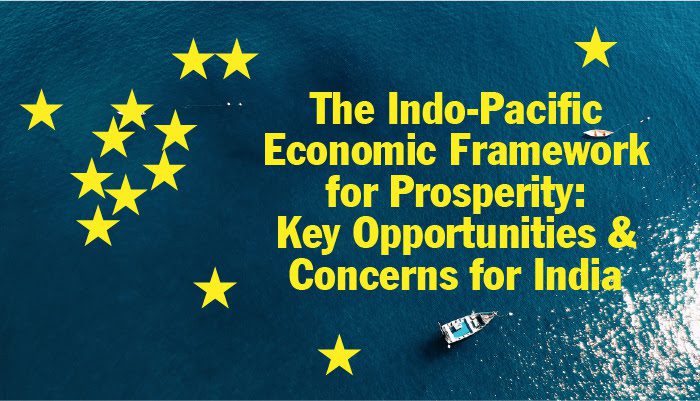On 23rd May 2022, India joined the QUAD countries and nine other nations to form the Indo-Pacific Economic Framework for Prosperity (IPEF), an economic collective comprising 12 nations representing 40% of global GDP. These include Australia, Brunei, India, Indonesia, Japan, South Korea, Malaysia, New Zealand, the Philippines, Singapore, Thailand and Vietnam. Despite being a QUAD initiative, the IPEF was unveiled by the US, still the pre-eminent power globally. The IPEF focuses on four aspects, namely: trade, supply chain resilience, clean energy and decarbonisation, taxes and anti-corruption measures.
The Framework aims to promote “resilience, sustainability, inclusiveness, economic growth, fairness, and competitiveness” in the economies of the member nations. The primary objective of the IPEF is to make the Indo-Pacific region a hub of global economic growth by introducing commonly-applicable and creative solutions to address the economic demands of a post-pandemic world. India has keenly expressed its interest in collaborating with partner nations towards achieving regional economic connectivity, integration, and boosting trade & investment. India also recently took part in an informal IPEF Ministerial meeting convened by the U.S.A in Paris on 11th June 2022.
In this light, the Ananta Centre held a panel discussion on “The Indo-Pacific Economic Framework for Prosperity- Key Opportunities & Concerns for India” on the 30th of June 2022 (5:00 – 6:00 pm) at WWF Auditorium, New Delhi. The discussion comprised Ambassador Shyam Saran(President, India International Centre),Montek Singh Ahluwalia(Distinguished Fellow, Centre for Social & Economic Progress & Former Deputy Chairman, Planning Commission of India) and Ambassador Mohan Kumar(Chairman, Research and Information System for Developing Countries) as panellists. The discussion was chaired by Mr T S Vishwanath(Principal Adviser, APJ-SLG Law Offices & Co-Founder, RV-VeKommunicate LLP).
The IPEF, from an Indian perspective, has a huge impact in terms of business opportunities/avenues as well as on supply chain issues. This is primarily because the Agreement talks about standards (whether it pertains to digital, medical, industries or other domains) that India will have to work on. The IPEF is an economic agreement rather than a trade agreement that looks at multiple dimensions of economic partnership between nations. The agreement does not duplicate the Asia-Pacific Economic Cooperation (APEC) Agreement, which is considered a unique trait of the IPEF. The Agreement does not incorporate aspects like tariff reduction or reciprocal commitments. Instead, it focuses on incorporating each member-nation’s best practices. Legal commitments are envisaged in the first pillar of IPEF regarding commitments on data flow and data localization, among others. Meanwhile, other pillars focus on mutually beneficial partnerships like supply chains, where the questions are more about making them diverse and preventing disruptions.
While talking about the pillars of climate change, energy and decarbonisation, it is to be noted that no legal commitments have been made. Rather, the agreement aims to build cooperation in terms of what can be done to decarbonize/deal with climate change and energy conservation. India’s participation in the IPEF was ensured by giving it flexibility in terms of which pillar India would want to join for and what India can negotiate in, as India has reservations about the trade aspect of the IPEF. India needs to rethink its import taxation policy (India has high import duties) in order to enter into good supply chains. Moreover, India needs to align itself to global standards as Indian industries would not enjoy credibility from other countries that work in a regulatory framework. It is the need of the hour for Indian industries to align with the EU carbon border adjustment mechanism, which is going to be applicable to the steel, cement and fertilizers industries (by giving them adequate but not lengthy transaction periods). Moreover, small groups within the IPEF could be formed with whom India can negotiate, like Indonesia.
India’s decision to opt out of RCEP was not right as, for any Indo- pacific agreement, the counties need a security pillar as well as an economic pillar. The RCEP did provide India with that economic pillar. It not only weakened India economically but also impacted India’s profile in the region. IPEF will help rebuild India’s image in that context. The IPEF provides India with a once-in-a-lifetime opportunity to shape policy, rules and regulations in the digital, environment and labour space (as there are countries like Indonesia who will be supportive of India). Moreover, important countries like Cambodia, Malaysia, Thailand, and Vietnam who are members of the IPEF, can be of help and support to India in being rule makers.
Additional references: –
- Can IPEF Outweigh India’s Over Dependency On China For Supply Chain? – Analysis – Eurasia Review
- Major power competition constrains ASEAN ambitions (eastasiaforum.org)
Please watch the full session on:-























